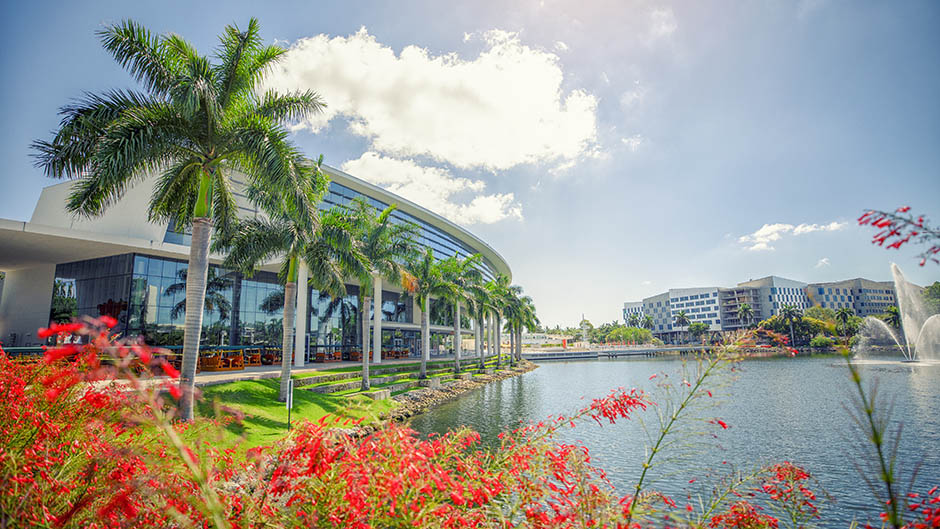Twelve teams from universities across the United States submitted their visions for real estate developments that provide social and environmental impact during Miami Herbert’s Case Competition on Impact Investing in Commercial Real Estate 2022. In its sixth year, the competition has garnered attention among top real estate programs for its real-life value and emphasis on impact investing, a niche area of commercial real estate dedicated to community-enhancing projects through socially and environmentally focused designs.
After two years of virtual presentations due to the COVID-19 pandemic, the competition returned to in-person finals on April 15. Finalist teams from Cornell, Columbia, UCLA, University of Miami, and Wharton came together at the UM campus to present their proposals to industry experts Kevin Fitzpatrick, CEO of Spring Bay Properties, Jim Mehalso, managing director of transactions at PGIM Real Estate, Joanne Rosen, founding partner of Beacon Advisors LLC, and Nadir Settles, managing director and New York regional head at Nuveen Real Estate.
Impressed by the soundness of financial analysis, assumptions, and ESG attributes, Settles describes the presentations as “phenomenal,” further stating: “These students have a very reduced learning curve and will be ready to present to professional investment committees soon.”
Cornell master’s in real estate students Chasidy Miles, Connor Mattoon, Kara Harrison-Gates, and Sasha Paikin received the highest marks and shared a $15,000 cash prize. Their vision, Cornerstone Care, would create an intergenerational assisted living facility for elderly and disabled residents as well as for caretakers and their families. Units of a six-story building in central Harlem would be equipped with essential elements for seniors and the disabled, such as reachable countertops, sensory touch faucets and features, and an HVAC sanitation system. The proposal would aim to improve the quality of life not only for the aging residents, but also for caretakers who would have access to benefits such as subsidized housing and childcare.
As a first-generation college student raised by a single mother who works as a caretaker in several facilities for the elderly, team member Miles feels a personal connection to the project. “Growing up, I understood early on the economic vulnerability of both caretakers and elderly patients, which became even clearer during the COVID-19 pandemic,” she reflects. She calls the win “so validating.”
The teams for Columbia and Wharton shared $10,000 in a second-place tie.
Columbia MBA students June Deng, Christine Yang, Niklas Lord, Chenjing Wang, and Jim Rowan proposed a plan to revitalize a five-story building in south Bronx into a mixed-use complex for working-class families and victims of domestic violence. The development, named Haven, would help enliven the Mott Haven neighborhood, located in a historically redlined district and disadvantaged sector of the Bronx. Assistance to victims would be attained through a partnership with a nonprofit and a dedicated floor for transitional housing. The building would also carry a grocery store, a bank to promote financial literacy within the neighborhood, and minority-owned retail stores to promote entrepreneurship.
“The competition really provided an understanding of the full cycle of an investment,” says team member Lord. “We had to source a building; we had to come up with our own numbers; and we had to do as much research as we could.”
Wharton MBA students Jordan Mays, Ellen Paik, Marques Stevenson, and undergraduate Caroline Li designed Berks Market as a mixed-income, urban development in Norris Square, Philadelphia, a community of predominantly low-income Puerto Rican and African American residents. Affordable housing and retail openings would support economic development in a region heavily affected by pandemic lockdowns. Additionally, the 139-unit, LEED-certified structure would hold a key location next to Berks train station and Fishtown and Northern Liberties, new cultural and entertainment hubs. The project would capture the neighboring activity and allow for a similar revitalization of Norris Square.
“We wanted to leverage the foot traffic of the up-and-coming towns to bring economic vitality to a neighboring, low-income area that reflects the diversity of Philadelphia,” Paik explains. She calls impact real estate development her passion, adding, “It was really awesome that this competition allowed me to explore the exact area that I hope to pursue a career in.”
Paik and fellow competition participants, as well as all students interested in impact investing, may benefit from a growing area in real estate. Miami Herbert Professor of Finance and Academic Director of Real Estate Programs Andrea Heuson, who organizes the annual contest, highlights the current shift in the market.
“Environmental or social impact used to be an afterthought and now it is becoming a focus. We are seeing more investors who are putting their money into investment strategies that specifically target ESG goals,” she says.
But she emphasizes that financial returns remain a core motivator for investors. The winning propositions had to offer plans to deliver social impact while demonstrating a profitable outlook.
Settles expands: “The students understand that every investment has an economic business plan and an impact business plan, and they walked away knowing that when you present your investment opportunity, you have to deliver both points.”

